Book
ISBN: 9789004355330 9004355332 9789004355347 9004355340 Year: 2018 Publisher: Leiden Boston
Abstract | Keywords | Export | Availability | Bookmark
 Loading...
Loading...Choose an application
- Reference Manager
- EndNote
- RefWorks (Direct export to RefWorks)
This Study of the Narrator in Nonnus of Panopolis' Dionysiaca by Camille Geisz investigates manifestations of the narratorial voice in Nonnus' account of the life and deeds of Dionysus (4th/5th century C.E.). Through a variety of interventions in his own voice, the narrator reveals much about his relationship to his predecessors, his own conception of story-telling, and highlights his mindfulness of the presence of his narratee. Narratorial devices in the Dionysiaca are opportunities for displays of ingeniousness, discussions of sources, and a reflection on the role of the poet. They highlight the innovative style of Nonnus' epic, written as a compendium of influences, genres, and myths, and encompassing the influence of a thousand years of Greek literature.
Literature. --- Narration (Rhetoric) --- Narration (Rhetoric). --- History --- Dionysus, --- Nonnus, --- In literature. --- Dionysiaca (Nonnus, of Panopolis). --- To 1500. --- Bacchus --- Bakchos --- Dionís --- Dionisas --- Dioniso --- Dionīss --- Dionisu --- Dioniz --- Dionizi --- Dionizo --- Dionizos --- Dionüszosz --- Dionysos --- Dionýzos --- Diyonizosse --- Διόνυσος --- Дионис --- ديونيسوس --- 디오니소스 --- דיוניסוס --- ディオニューソス --- 狄俄倪索斯 --- Βάκχος --- Діоніс --- Dionysus --- E-books --- Rhetoric --- Discourse analysis, Narrative --- Narratees (Rhetoric) --- Narration --- Nonnos de Panopolis --- Critique et interprétation. --- Les Dionysiaques.
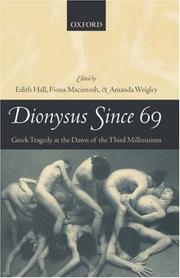
ISBN: 1280905212 019155541X 1423768035 9781423768036 9780199259144 0199259143 9781280905216 9786610905218 6610905215 0199281319 9780199281312 9780191555411 1383040117 Year: 2023 Publisher: Oxford : Oxford University Press,
Abstract | Keywords | Export | Availability | Bookmark
 Loading...
Loading...Choose an application
- Reference Manager
- EndNote
- RefWorks (Direct export to RefWorks)
The 14 essays in this text, from an interdisciplinary team, relate the recent appeal of Greek tragedy to social trends, political developments, aesthetic and performative developments, and the intellectual currents of the last three decades.
Greek drama --- Greek drama (Tragedy) --- Theater --- Languages & Literatures --- Greek & Latin Languages & Literatures --- Dramatics --- Histrionics --- Professional theater --- Stage --- Theatre --- Performing arts --- Acting --- Actors --- Greek literature --- Presentation, Modern --- History and criticism --- Appreciation --- Adaptations --- History --- Production and direction --- Dionysus --- In literature. --- Bacchus --- Bakchos --- Dionís --- Dionisas --- Dioniso --- Dionīss --- Dionisu --- Dioniz --- Dionizi --- Dionizo --- Dionizos --- Dionüszosz --- Dionysos --- Dionýzos --- Diyonizosse --- Διόνυσος --- Дионис --- ديونيسوس --- 디오니소스 --- דיוניסוס --- ディオニューソス --- 狄俄倪索斯 --- Βάκχος --- Діоніс --- Dionysus (Greek diety) --- Presentation, Modern. --- History and criticism. --- Production and direction.
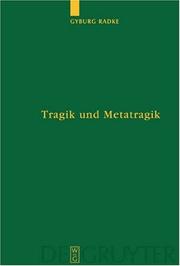
ISBN: 3110180227 3110913291 Year: 2014 Volume: 66 Publisher: Berlin ; Boston : De Gruyter,
Abstract | Keywords | Export | Availability | Bookmark
 Loading...
Loading...Choose an application
- Reference Manager
- EndNote
- RefWorks (Direct export to RefWorks)
What is the tragic in Euripides' Bacchae? A nowadays predominant view sees it in the self-reflexion of the genus 'tragedy' and the medium 'theatre': The presence of the theatre god Dionysos on stage turns the tragic of the Bacchae into metatragic. In contrast, by carefully scrutinizing the premises of structuralist methods applied and by interpreting the complete text of the play, Gyburg Radke reads the Bacchae as a 'textbook example' of an Aristotelian tragedy evoking fear and pity, in which the combination of the individual character of the protagonist Pentheus and of his failure constitutes the tragic quality of the plot. Worin liegt die Tragik der Bakchen des Euripides? - Eine heute dominierende Forschungsrichtung meint: in der reflexiven Selbstthematisierung der Gattung Tragödie und des Mediums Theater. Das Auftreten des Theatergottes Dionysos bedeutet, im Sinn dieses strukturalistischen Ansatzes, die Erhebung der Tragik der Bakchen zur Metatragik. Die hier vorgelegte Untersuchung stellt durch eine allgemeine hermeneutische Reflexion auf die Prämissen der Anwendung strukturalistischer Methoden und durch eine vollständige Textinterpretation der Bakchen eine Gewinn- und Verlustbilanz metatheatralischer Deutungen auf. Sie liest die Bakchen als Gegenthese dazu als 'Schulbeispiel' einer Furcht- und Mitleidtragödie, in der der Zusammenhang zwischen dem individuellen Charakter des Protagonisten Pentheus und seinem Scheitern die tragische Qualität der Handlung ausmacht.
Tragedie --- Tragedy --- Tragédie --- Treurspel --- Bacchantes in literature. --- Dionysia in literature. --- Dionysus (Greek deity) in literature. --- Pentheus (Greek mythology) in literature. --- Tragedy. --- Tragic, The, in literature. --- Bacchantes in literature --- Dionysia in literature --- Dionysus (Greek deity) in literature --- Pentheus (Greek mythology) in literature --- Tragic, The, in literature --- Drama --- Euripides. --- Euripides --- Pentheus, --- Dionysus --- In literature. --- Bacchus --- Bakchos --- Dionís --- Dionisas --- Dioniso --- Dionīss --- Dionisu --- Dioniz --- Dionizi --- Dionizo --- Dionizos --- Dionüszosz --- Dionysos --- Dionýzos --- Diyonizosse --- Διόνυσος --- Дионис --- ديونيسوس --- 디오니소스 --- דיוניסוס --- ディオニューソス --- 狄俄倪索斯 --- Βάκχος --- Діоніс --- Penthée, --- Πενθεύς, --- Τενθεύς, --- Tentheus,
Book

ISBN: 9783110222340 9783110222357 3110222345 3110222353 1306968313 Year: 2011 Publisher: Berlin Boston
Abstract | Keywords | Export | Availability | Bookmark
 Loading...
Loading...Choose an application
- Reference Manager
- EndNote
- RefWorks (Direct export to RefWorks)
Dionysos erscheint innerhalb der modernen Wissens- und Darstellungsformationen oft als untypisch für die antike Kultur, als Ausnahme im Kontext des antiken Polytheismus, ja als Instanz einer Differenz, die die Moderne antizipiert. Was können neuere Forschungen zum genaueren Verständnis der vielfältigen Transformationen des antiken Gottes beitragen? Dieser Frage widmen sich Vertreter aller Bereiche der Altertumswissenschaften in diesem Band, der aus einer internationalen Tagung im März 2009 im Berliner Pergamonmuseum hervorgeht. Eine vergleichbare Publikation liegt bisher weder in deutscher oder englischer noch in anderen Sprachen vor. Zu den in dem Band behandelten Themen gehören aktuelle Forschungsfragen - einschließlich wissenschaftsgeschichtlicher Aspekte - zur Stellung des Dionysos im Rahmen der antiken griechischen und römischen Religion von den Anfängen bis zur Spätantike (Riten und Festkultur, Mythen, Epiphaniekonzepte, Theaterpraxis, Architektur und Ökonomie der Heiligtümer), anhand von - zum Teil neuentdeckten - epigraphischen, literarischen, bildkünstlerischen, historiographischen und philosophischen Quellen.
Dionysus (Greek deity) --- Dionysus (Greek deity) in literature --- Cult --- Art --- Dionysoskult. --- Mythologie. --- Polytheismus. --- Rezeption. --- Kult. --- Dionysus (Greek deity). --- Literature. --- Polytheism --- Art. --- Cult. --- Dionysus, --- Dionysos. --- Dionysos, --- In literature --- Geschichte. --- Polytheism. --- Dionysus (Greek deity) -- Art -- Congresses. --- Dionysus (Greek deity) -- Congresses. --- Dionysus (Greek deity) -- Cult -- Congresses. --- Dionysus (Greek deity) in literature -- Congresses. --- Religion --- Philosophy & Religion --- European Religions - pre-Christian --- Dionysus --- Bacchus --- Bakchos --- Dionís --- Dionisas --- Dioniso --- Dionīss --- Dionisu --- Dioniz --- Dionizi --- Dionizo --- Dionizos --- Dionüszosz --- Dionysos --- Dionýzos --- Diyonizosse --- Διόνυσος --- Дионис --- ديونيسوس --- 디오니소스 --- דיוניסוס --- ディオニューソス --- 狄俄倪索斯 --- Βάκχος --- Діоніс --- Antike. --- Antiquity. --- Religion. --- HISTORY / Ancient / Greece. --- Dionysus (Greek deity) - Art - Congresses --- Dionysus (Greek deity) - Congresses. --- Dionysus (Greek deity) - Cult - Congresses --- Dionysus (Greek deity) in literature - Congresses
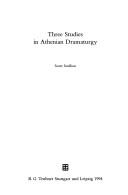
ISBN: 3519074745 3598774745 3110950537 9783110950533 9783519074748 Year: 1994 Volume: Bd. 25 Publisher: Stuttgart G.B. Teubner
Abstract | Keywords | Export | Availability | Bookmark
 Loading...
Loading...Choose an application
- Reference Manager
- EndNote
- RefWorks (Direct export to RefWorks)
Keine ausführliche Beschreibung für "Three Studies in Athenian Dramaturgy" verfügbar.
Dionysus (Greek deity) --- -Greek drama (Tragedy) --- -Ajax (Greek mythology) in literature --- Theater --- -Drama --- Drama, Modern --- Plays --- Stage --- Literature --- Acting --- Dialogue --- Dramatics --- Histrionics --- Professional theater --- Theatre --- Performing arts --- Actors --- Cult --- History and criticism --- History --- -Technique --- Philosophy --- Aeschylus --- Sophocles --- Eskhil --- Eschylus --- Aischylos --- Esquilo --- Eschilo --- Aiskhilos --- Eshil --- Æskílos --- Ajschylos --- Eschil --- Eschyle --- Äschylos --- Eskili --- Aiszkhülosz --- Eschylos --- Iskilos --- Эсхил --- אייסכילוס --- איסכילאס --- איסכילוס --- إيسخولوس --- ايسخيلوس --- Αἰσχύλος --- Technique. --- Homes and haunts --- -Homes and haunts --- -Dionysus (Greek deity) --- -Cult --- Sofokles --- Sophocle --- Sofocle --- Sophokles --- Sofocles --- -Theater --- Greek drama (Tragedy) --- Ajax (Greek mythology) in literature. --- Drama --- History and criticism. --- Cult. --- Sophocles. --- Athens (Greece) --- Intellectual life. --- Dramaturgy --- -Dramatics --- Authorship --- Playwriting --- Technique --- Ajax (Greek mythology) in literature --- Dionysus --- Bacchus --- Bakchos --- Dionís --- Dionisas --- Dioniso --- Dionīss --- Dionisu --- Dioniz --- Dionizi --- Dionizo --- Dionizos --- Dionüszosz --- Dionysos --- Dionýzos --- Diyonizosse --- Διόνυσος --- Дионис --- ديونيسوس --- 디오니소스 --- דיוניסוס --- ディオニューソス --- 狄俄倪索斯 --- Βάκχος --- Діоніс --- Esḳilos --- Sófocles --- Sofoklis --- Sofokl --- Sūfūklīs --- Sūtmūklīs --- Sofokŭl --- סופוקלס --- سوفوكليس --- Σοφοκλῆς --- Sophoclis
Book
ISBN: 0691065284 0691101353 Year: 1997 Publisher: Princeton, New Jersey : Princeton University Press,
Abstract | Keywords | Export | Availability | Bookmark
 Loading...
Loading...Choose an application
- Reference Manager
- EndNote
- RefWorks (Direct export to RefWorks)
In his play Bacchae, Euripides chooses as his central figure the god who crosses the boundaries among god, man, and beast, between reality and imagination, and between art and madness. In so doing, he explores what in tragedy is able to reach beyond the social, ritual, and historical context from which tragedy itself rises. Charles Segal's reading of Euripides' Bacchae builds gradually from concrete details of cult, setting, and imagery to the work's implications for the nature of myth, language, and theater. This volume presents the argument that the Dionysiac poetics of the play characterize a world view and an art form that can admit logical contradictions and hold them in suspension.
Bacchantes in literature --- Greek drama (Tragedy) --- Mythology, Greek --- Bacchantes dans la littérature --- Tragédie grecque --- Mythologie grecque --- Drama --- Théâtre --- Euripides. --- Dionysus --- Pentheus, --- In literature --- Dionysus (Greek deity) in literature --- Pentheus (Greek mythology) in literature --- Tragedy --- Euripides --- Euripide --- Bacchantes dans la littérature --- Tragédie grecque --- Théâtre --- In literature. --- Dionysos (Divinite grecque) dans la litterature. --- LITERARY CRITICISM / Ancient & Classical. --- Achelous. --- Actaeon. --- Amphitryon. --- Anaxagoras. --- Anthesteria. --- Archelaus of Macedon. --- Artemis. --- Bacchylides. --- Cronos. --- Demeter. --- Democritus. --- Dionysiac poetics. --- Dithyrambus. --- Echidna. --- Evil Mother. --- Golden Age. --- Heracles. --- Heraclitus. --- Icarius. --- Iophon. --- Macedon. --- Melanthus. --- adolescence. --- agriculture. --- anagnorisis. --- boundaries. --- brochos. --- cannibalism. --- carnival. --- catharsis. --- chthonic. --- culture-hero. --- doubling. --- enclosure. --- epiphany. --- flight. --- forest. --- gates. --- hair. --- hands. --- hunt. --- kentron. --- kingship, sacred. --- landscape. --- libation. --- liminal. --- loom. --- male womb. --- metamorphosis. --- mountain. --- myth. --- narthex. --- nature. --- Bacchus --- Bakchos --- Dionís --- Dionisas --- Dioniso --- Dionīss --- Dionisu --- Dioniz --- Dionizi --- Dionizo --- Dionizos --- Dionüszosz --- Dionysos --- Dionýzos --- Diyonizosse --- Διόνυσος --- Дионис --- ديونيسوس --- 디오니소스 --- דיוניסוס --- ディオニューソス --- 狄俄倪索斯 --- Βάκχος --- Діоніс
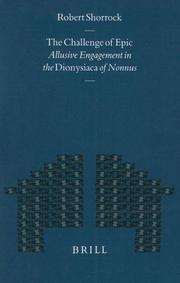
ISBN: 9004117954 9789004117952 9004351108 Year: 2001 Volume: 210 Publisher: Leiden ; Boston : Brill,
Abstract | Keywords | Export | Availability | Bookmark
 Loading...
Loading...Choose an application
- Reference Manager
- EndNote
- RefWorks (Direct export to RefWorks)
Nonnus once vied with Homer for popularity; today his Dionysiaca languishes in obscurity. The Challenge of Epic offers a literary critical rehabilitation of Nonnus' fifth-century AD poem. It argues that modern neglect stems from a failure to appreciate the central position of allusion in late-antique poetry. Attention first focuses on intertextual allusion. It is argued that the poet draws on a plethora of allusions to the cycle of Greek mythology in order to imbue his specific narrative with a universal significance. Focus then shifts to metapoetic allusion: the way in which Nonnus alludes self-consciously to the process of writing, and develops parallels between himself and his subject, Dionysus. Through an appreciation of Nonnus' alllusive strategies, the modern reader can again engage with the mind-bending challenge of the Dionysiaca .
Epic poetry, Greek --- Dionysus (Greek deity) in literature --- Allusions in literature --- Intertextuality --- Poésie épique grecque --- Dionysos (Divinité grecque) dans la littérature --- Allusions dans la littérature --- Intertextualité --- History and criticism --- Histoire et critique --- Nonnus, --- Dionysus (Greek deity) in literature. --- Allusions in literature. --- Intertextuality. --- History and criticism. --- Dionysus --- In literature. --- -Intertextuality --- Criticism --- Semiotics --- Influence (Literary, artistic, etc.) --- Greek epic poetry --- Epic poetry, Classical --- Greek poetry --- Nonnus of Panopolis --- Poésie épique grecque --- Dionysos (Divinité grecque) dans la littérature --- Allusions dans la littérature --- Intertextualité --- In literature --- Bacchus --- Bakchos --- Dionís --- Dionisas --- Dioniso --- Dionīss --- Dionisu --- Dioniz --- Dionizi --- Dionizo --- Dionizos --- Dionüszosz --- Dionysos --- Dionýzos --- Diyonizosse --- Διόνυσος --- Дионис --- ديونيسوس --- 디오니소스 --- דיוניסוס --- ディオニューソス --- 狄俄倪索斯 --- Βάκχος --- Діоніс --- Epic poetry, Greek - History and criticism.
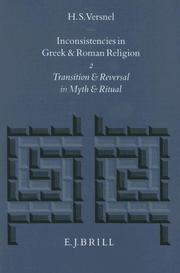
ISBN: 9004092668 9004092684 9004092676 9004296727 9004296735 9789004092662 9789004092686 Year: 1998 Volume: 6 Publisher: Leiden : E.J. Brill,
Abstract | Keywords | Export | Availability | Bookmark
 Loading...
Loading...Choose an application
- Reference Manager
- EndNote
- RefWorks (Direct export to RefWorks)
This is the first of a two-volume collection of studies in inconsistencies in Greek and Roman religion. Their common aim is to argue for the historical relevance of various types of ambiguity and dissonance. The first volume focuses on the central paradoxes in ancient henotheism. The term 'henotheism' -- a modern formation after the stereotyped acclamation: #EIS O QEOS# ('one is the god'), common to early Christianity and contemporaneous paganism -- denotes the specific devotion to one particular god without denying the existence of, or even cultic attention to, other gods. After its prime in the twenties and thirties of this century the term fell into disuse. Nonetheless, the notion of henotheism represents one of the most remarkable and significant shifts in Graeco-Roman religion and hence deserves fresh reconsideration.
#GROL:SEMI-292 --- 292.211 --- Religion Classical Greek and Roman Gods, goddesses, divinities and deities --- Greece --- Rome --- Religion. --- 292 --- Religion Classical Greek and Roman --- Religion --- Grèce --- Isis --- Dionysus --- Hermes, --- Ermete Trimegisto --- Ermete Trismegisto --- Hermes Mercurius Trismegistus --- Hermès Trismégiste --- Hermes Trismegistos --- Hermes Trismegistus. --- Mercurius Trismegistus --- Thoth --- Trismegistus, Hermes --- هرمس، --- Bacchus --- Bakchos --- Dionís --- Dionisas --- Dioniso --- Dionīss --- Dionisu --- Dioniz --- Dionizi --- Dionizo --- Dionizos --- Dionüszosz --- Dionysos --- Dionýzos --- Diyonizosse --- Διόνυσος --- Дионис --- ديونيسوس --- 디오니소스 --- דיוניסוס --- ディオニューソス --- 狄俄倪索斯 --- Βάκχος --- Діоніс --- Aset --- Eset --- Iset --- İsida --- Isidi --- Izida --- Iziso --- Iside --- Izidė --- Ízisz --- Izyda --- 伊西斯 --- Yi xi si --- イシス --- Ishisu --- איזיס --- 이시스 --- Isiseu --- Исида --- Изида --- Ісіда --- إيزيس --- Īzīs --- Ἴσις --- Greece - Religion --- Rome - Religion
Book
ISSN: 09277633 ISBN: 9004270124 9004270116 1322343462 9789004270114 Year: 2015 Publisher: Leiden Brill
Abstract | Keywords | Export | Availability | Bookmark
 Loading...
Loading...Choose an application
- Reference Manager
- EndNote
- RefWorks (Direct export to RefWorks)
"Dionysos, with his following of satyrs and women, was a major theme in a big part of the figure painted pottery in 500-300 B.C. Athens. As an original testimonial of their time, the imagery on these vases convey what this god meant to his worshippers. It becomes clear that - contrary to what is usually assumed - he was not only appropriate for wine, wine indulgence, ecstasy and theatre. Rather, he was present in both the public and private sphere on many, both happy and sad, occasions. In addition, the vase painters have emphasized different aspects of Dionysos for their customers inside and outside of Athens, depending on the political and cultural situation"--
Vase-painting, Greek --- Vases, Red-figured --- Dionysus --- Cult. --- Red-figure vases --- Red-figured vases --- Vases, Red-figure --- Bacchus --- Bakchos --- Dionís --- Dionisas --- Dioniso --- Dionīss --- Dionisu --- Dioniz --- Dionizi --- Dionizo --- Dionizos --- Dionüszosz --- Dionysos --- Dionýzos --- Diyonizosse --- Διόνυσος --- Дионис --- ديونيسوس --- 디오니소스 --- דיוניסוס --- ディオニューソス --- 狄俄倪索斯 --- Βάκχος --- Діоніс --- Vases, Ancient --- Cults. --- Vase-painting, Greek. --- Vases, Red-figured. --- Greece --- Greek vase-painting --- Alternative religious movements --- Cult --- Cultus --- Marginal religious movements --- New religions --- New religious movements --- NRMs (Religion) --- Religious movements, Alternative --- Religious movements, Marginal --- Religious movements, New --- Religions --- Sects --- Vase-painting, Greek - Greece - Athens. --- Vases, Red-figured - Greece - Athens. --- Dionysus - (Greek deity) --- Dionysus - (Greek deity) - Cult. --- Dionysus - (Greek deity) - Art. --- Art. --- Peinture de vases grecque --- Vases à figures rouges --- Classics --- Comparative religion --- Iconography --- History of ancient Greece --- Dionysus [Mythological character] --- Athens
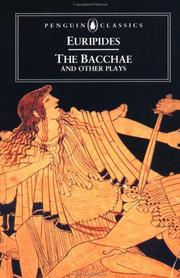
ISBN: 0140440445 9780140440447 Year: 1983 Publisher: Harmondsworth Penguin Books
Abstract | Keywords | Export | Availability | Bookmark
 Loading...
Loading...Choose an application
- Reference Manager
- EndNote
- RefWorks (Direct export to RefWorks)
Classical Greek literature --- Bacchantes --- Euripides --- Pentheus, --- Dionysus --- Ion --- Hecuba, --- Helen, --- Ecuba, --- Hecabe, --- Hécube, --- Hekaba, --- Hekabē, --- Hekabo, --- Hekuba, --- 赫库芭, --- ヘカベー, --- הקובה, --- 헤카베, --- Гекаба, --- Гекуба, --- Хекаба, --- Хекуба, --- هکابه, --- هيكوبا, --- Ἑκάβη, --- Elena, --- Helena, --- Helenē, --- Yelena, --- 海伦 , --- ヘレネー, --- הלנה, --- העלענע, --- 헬레네, --- Хелена, --- Єлена, --- Елена , --- هلن, --- هيلين, --- Ἑλένη, --- Ió --- Iōnas --- Ione --- Jonas --- 伊昂 --- 이온 --- Јон --- Іон --- Йон --- إيون --- Ἴων --- Ἰωνας --- Bacchus --- Bakchos --- Dionís --- Dionisas --- Dioniso --- Dionīss --- Dionisu --- Dioniz --- Dionizi --- Dionizo --- Dionizos --- Dionüszosz --- Dionysos --- Dionýzos --- Diyonizosse --- Διόνυσος --- Дионис --- ديونيسوس --- 디오니소스 --- דיוניסוס --- ディオニューソス --- 狄俄倪索斯 --- Βάκχος --- Діоніс --- Penthée, --- Πενθεύς, --- Τενθεύς, --- Tentheus, --- Ėvripid --- Yūrībīdīs --- Euripide --- Euripedes --- Eŭripido --- Eurypides --- Euripidesu --- אוריפידס --- エウリーピデース --- Εὐριπίδης --- Translations into English.

 Search
Search Feedback
Feedback About UniCat
About UniCat  Help
Help News
News